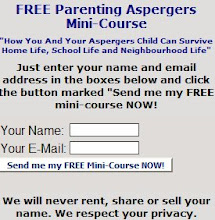if you are the parent who just received the confirmation of
Aspergers Diagnosis of your child do not panic. It is not the end of the world. So, what to do? How to deal with this Aspergers Diagnosis? Is there something to
help your child as well as the whole family?
I know that leaving with aspergers diagnosis of your child is not easy, on the other hand NOW you know why your child is behaving like this.It is what it is. Think of your child’s diagnosis as information. Your child is the same child he was before the diagnosis. Now you have an explanation for his weaknesses and even some of his strengths. Keep a positive attitude by focusing on the strengths.
The biggest step a parent has to take after the diagnosis of Asperger’s Syndrome is acknowledgement and acceptance. As hard as it sounds right now, you have to accept the diagnosis and move on.
Is there any help? What to do?
1. Educate yourself and your family about Asperger’s SyndromeYou must learn all you can about Asperger’s. There are many books available written by professionals and by parents of children with Asperger’s.
For example,
Embarrassed Often, Ashamed Never
by Lisa Elliott is an encouraging and often humorous glimpse into her life as the parent of a child with Asperger’s Syndrome.
This is a great choice for parents and family members of a child with Asperger’s. You can read about it at
2. Find local Asperger’s Syndrome support groupsConnect with local families who have been where you are in the process. These families know firsthand what it’s like to live with Asperger’s. It is comforting and powerful to be with others who are on the same journey. These support groups can
help you find treatment resources in your area, community events for your family to attend, and more.
3. Seek individual and family counselingAsperger’s brings an added risk of anxiety and depression. Your child will benefit from counseling. While seeking a counselor for your child, consider finding a family counselor. You are all affected emotionally be this diagnosis. Individual and family therapy can help you work through the rough spots that will come.
4. Keep a check on your physical well-beingRegular medical care is necessary since stress can cause physical illness. Your well-being is necessary in order to care for your family. Allow time for yourself and your hobbies. Plan regular outings and just be a family. Asperger’s shouldn’t
control your life.
5. Don’t let the cynics get you down. You can’t stop people from reacting negatively to your child, but you can stop
responding to their negativity. If they miss the joy of knowing your child, that is their problem.
Article Source: "
What Every Parent Ought To Know About Their Aspergers Child"
From: Dave Angel (Author of "
The Parenting Aspergers Resource Guide")
Dave Angel is a social worker with over 11 years real life experience in the field working with families just like yours and a Masters Degree in Applied Social Studies.
Over the past eleven years he has worked with hundreds of families who have had children with special needs (both young and old) and have a special interest in Aspergers.
Read more about effective methods which can have a really positive effect on your aspergers child:
ASPERGER SYNDROME BEHAVIOR BLOGAsperger Syndrome behavior - Practical HelpAspergers TreatmentAspergers Syndrome CauseAsperger Syndrome BehaviourAsperger Syndrome Behavior - Sexual BehaviorASPERGER SYNDROME BEHAVIOR BLOGAspergers Temper TantrunsAspergers DietAspergers Syndrom CauseAsperger Syndrome DetailsAspergers Symptoms





